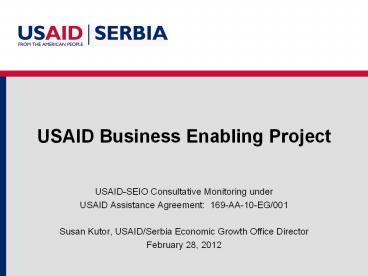USAID Business Enabling Project PowerPoint PPT Presentation
Title: USAID Business Enabling Project
1
USAID Business Enabling Project
- USAID-SEIO Consultative Monitoring under
- USAID Assistance Agreement 169-AA-10-EG/001
- Susan Kutor, USAID/Serbia Economic Growth Office
Director - February 28, 2012
2
USAID Business Enabling ProjectSEIO Aid
coordination sector Private Sector Development
Public Administration
Budget and Duration Total Life of Project funding 16.7 million January 2011 December 2015
Implementing Partner Cardno Emerging Markets Chief of Party Joe Lowther
Objective A More Competitive Market Economy
Agreement 169-AA-10-EG/001
Components Business Regulation and Economic Governance Macroeconomic Policy and Public Financial Management Financial Market Development
3
CONSULATIVE PROCESS TO DATE
- Spring 2011 - Consultations with GoS counterparts
helped to develop and reach agreement on Year One
work plan priorities - February 2012 BEP held two-day retreat with GoS
counterparts to discuss Year Two work plan in
depth - Date of USAID-GoS work plan reviews
- Last review May 2011
- Next review February 2012
4
STATE OF IMPLEMENTATION
- Inspections Reform A series of roundtables and
outreach led to the establishment of a GoS
inter-ministerial Inspections Reform Coordination
Body, and development of an inspections reform
strategy is underway. - Access to Finance A series of roundtables and
outreach has been completed compilation into
detailed issues paper and recommendations for
reforms to be completed in Spring 2012 - Quasi-fiscal Charges USAID is conducting a
study of quasi-fiscal charges that will quantify
the quasi fiscal charges imposed on business, and
will provide recommendations and guidelines for
reform.
5
STATE OF IMPLEMENTATION (continued)
- Construction Permits A study and stakeholders
dialogue on the main constraints is ongoing, with
the study to be completed in March 2012. This
study will provide guidelines and an action plan
for reform. - Enforcement of Judgments Out of 19 bylaws need
to implement new law, 4 were developed and
adopted 7 were developed and are ready to be
adopted 8 need to be developed. - Data Gathering A representative Business Survey
of 1000 Serbian-owned businesses identified
issues, established baseline and dialogue. - A Standard Cost Model quantified the cost of
inefficient administrative procedures, helping to
establish reform priorities
6
KEY CONTRIBUTIONS FROM GOS PARTNERS FOR YEAR ONE
- The GoS Coordination Body for Inspections Reform
was formed. - 11 Bylaws for the new Law on Enforcement were
developed 4 adopted. - A GoS Decree on conversion of usage rights to
ownership rights was enacted, positively
affecting the construction business. - All of the bylaws for the Capital Markets Law
were adopted. - The Fiscal Council was established and operating
in accordance with the law has informed budget
decisions.
7
INDICATORS BUSINESS ENABLING ENVIRONMENT
IMPROVED
- Decrease in the Burden of Government
Regulations World Economic Forum - May - Number of Commerce Laws and Regulations
Simplified and Implemented in Accordance with
International Standards - - - 24 bylaws/amendments adopted in Year One
- Decrease in costs for businesses to comply with
the regulatory framework baseline established
through Standard Cost Model
8
INDICATORS MACROECONOMIC ENVIRONMENT IMPROVED
- Increase in Foreign Direct Investment
- Improvements in the Open Budget Index (OBI)
Score as reported by the International Budget
Partnership Every 3 years - 2013 - Improved score in WEF GCI Financial Market
Development indicator September - Improved Government Budget Balance as percentage
of GDP April - Increased credit to private sector as a
percentage of GDP end of project
9
OBSTACLES AND PROPOSED SOLUTIONS
- Issue 1 The Ministry of Justice is
insufficiently focused on proper implementation
of the Law on Enforcement of Judgments. Bylaws
and system still not in place. - Risk The Ministry is not ready for
implementation of the law by May 2012,
particularly fielding and supervising the new
Professional Enforcement Officers, and the law is
not successfully implemented. - Solution Ministry of Justice needs to appoints
a project leader with the authority and time to
manage implementation. USAID will transition
work on enforcement of judgments to the upcoming
GIZ project.
10
OBSTACLES AND PROPOSED SOLUTIONS
- Issue 2 USAID has not been able to provide
critical assistance in performance-based
budgeting as envisioned due to lack of
receptivity on the part of the Budget Department
of the Ministry of Finance. - Risk The lack of performance-based budgeting
perpetuates the current practice of basing the
budget on short-term considerations and political
expediencies. - Solution The GoS provides direction to the
Budget Department of the Ministry of Finance to
implement performance-based budgeting.
11
Discussion

